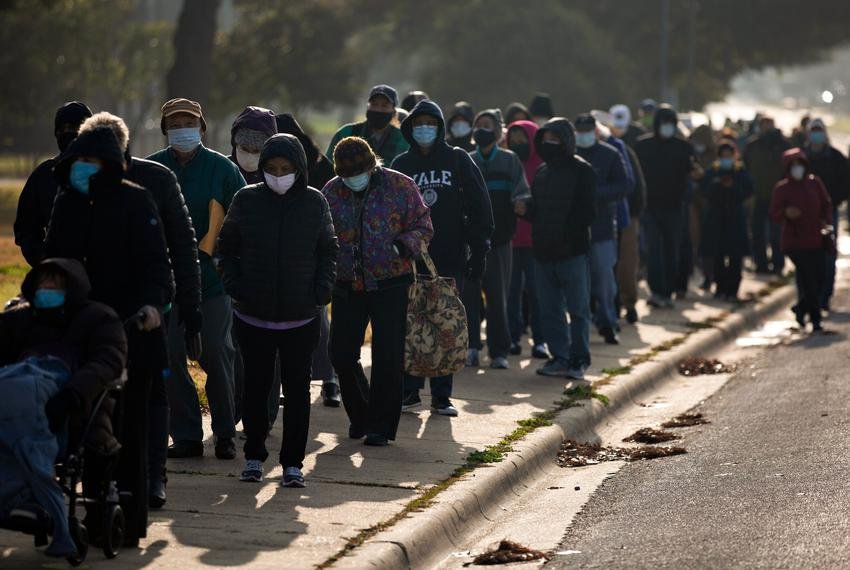Dallas axed plan to prioritize vaccinating Hispanic, Black neighborhoods after state of Texas threatened to slash doses

DALLAS, Texas -- Faced with the threat that the state might slash its vaccine allocation, Dallas officials in late January reversed course on a plan that would have prioritized doses for people living in the county’s most vulnerable ZIP codes, primarily in communities of color.
A divided Dallas County Commissioners Court had voted to prioritize vaccines at its Fair Park distribution center for individuals in mostly Black and Latino neighborhoods, a reflection of increased vulnerability to the coronavirus in 11 Dallas County ZIP codes, according to the Dallas Morning News.
In Texas and across the nation, communities of color have been hardest hit by the novel coronavirus, and health officials are grappling with how to ensure equity in the vaccine rollout. In Dallas, as in some other major Texas cities, distribution sites are more commonly located in white neighborhoods, and early data showed the North Texas county had distributed most of its shots to residents of whiter, wealthier neighborhoods.
Dallas leaders tried to prioritize any residents who meet the state’s criteria for vaccination and live in one of the 11 ZIP codes, which are all completely or partially south of Interstate 30, a dividing line that splits the county along racial and socioeconomic lines, the Dallas Morning News reported this week.
But Texas health officials pushed back on the proposal, warning that it was “not acceptable to [the Department of State Health Services.]”
“While we ask hub providers to ensure vaccine reaches the hardest hit areas and populations, solely vaccinating people who live in those areas is not in line with the agreement to be a hub provider,” Imelda Garcia, an associate commissioner with DSHS, wrote to Dallas health officials in a letter obtained by The Texas Tribune. “If Dallas County is unable to meet these expectations, we will be forced to reduce the weekly vaccine allocation to Dallas County Health and Human Services and no longer consider it a hub provider.”
Her letter came after Dallas County Judge Clay Jenkins wrote to state officials asking whether the county’s plan was permissible.
The county government is responsible for just 10% of the vaccines distributed in Dallas County. Most of the vaccines are actually distributed by hospitals and other health-related institutions.
In an emergency meeting, Jenkins successfully encouraged commissioners to reverse the plan. They could broach the issue again, he said, but for now they should axe the prioritization plan to ensure the county gets its shipments from the state.
In a spirited and at times tense meeting, Commissioner J.J. Koch, who proposed the order in the first place, pushed to maintain language prioritizing the vulnerable ZIP codes and accused Jenkins of being “disingenuous.” Koch proposed tweaks to the order to meet the state’s specifications while still prioritizing the hard-hit communities.
“I'm not willing to risk the vaccine for tens of thousands of people over the next few weeks because you guess that your order is good enough to satisfy the state,” Jenkins said.
“I’m certain” that the order will be acceptable to state officials, Koch shot back.
“You got us in the situation we’re in tonight,” Jenkins replied. “The more you keep doing this, the more you’re hurting the people of Dallas County.”
Ultimately, the court voted to rescind the order — but agreed to meet again to design a vaccination plan that will be “transparent and accountable,” as Koch put it.
“We’re all trying to get to the same place,” Jenkins said, trying to pacify the group.
“No, we’re not,” objected Commissioner John Wiley Price, who represents South Dallas and raised concerns throughout the meeting that the county was not doing enough to serve vulnerable communities.
Dallas Mayor Eric Johnson declined to comment on the debate.
"All hub providers agreed to vaccinate people without regard to where they live, including from surrounding counties, and we expect them to do that. That doesn’t prevent them from focusing some efforts on specific populations," said DSHS spokesman Chris Van Deusen. "In fact, we directed them to ensure they are vaccinating people in the hardest hit areas and populations, but they cannot do that to the exclusion of literally everyone else.


